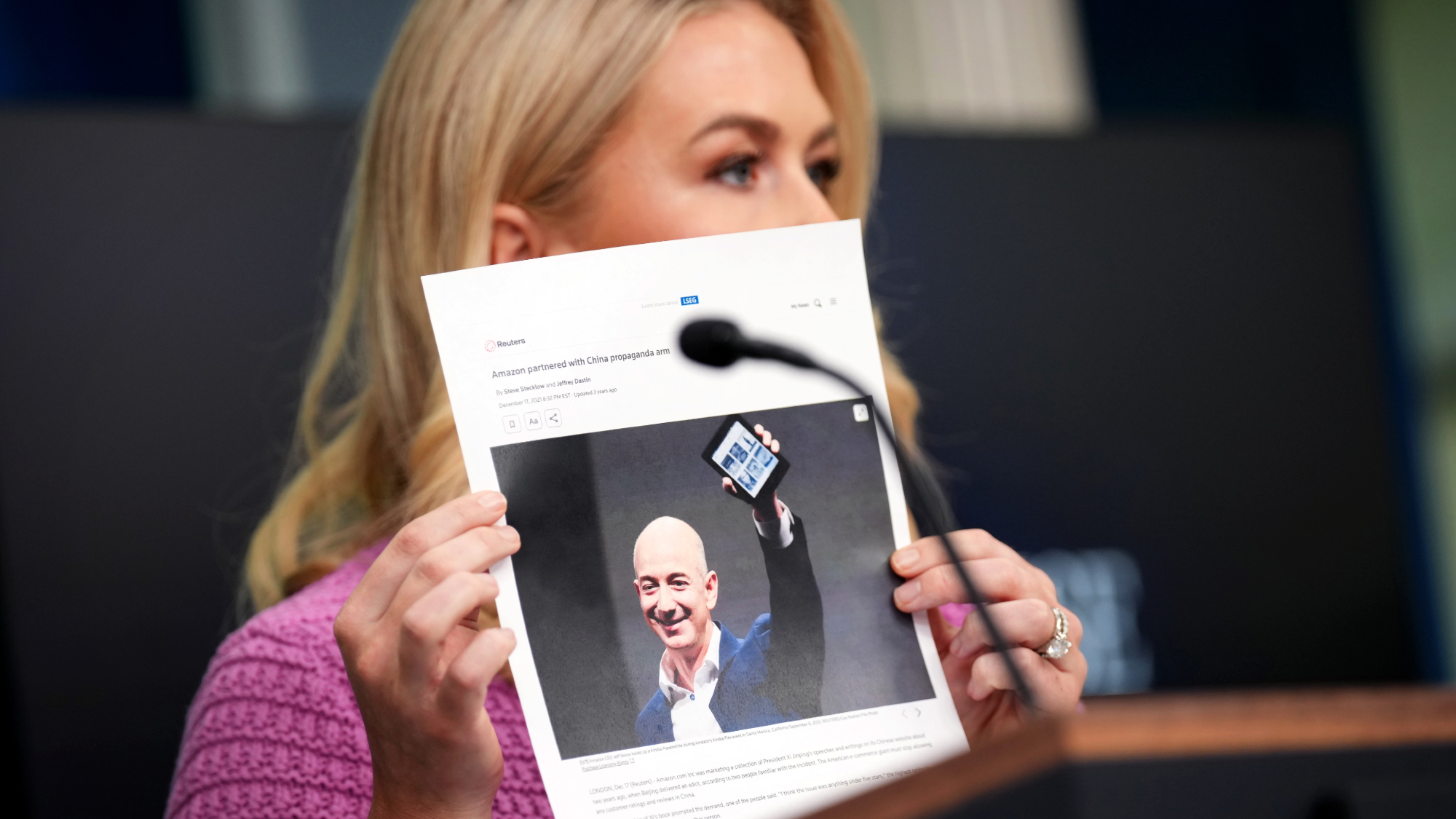Trump calls Amazon's Bezos over tariff display
The president was not happy with reports that Amazon would list the added cost from tariffs alongside product prices


A free daily email with the biggest news stories of the day – and the best features from TheWeek.com
You are now subscribed
Your newsletter sign-up was successful
What happened
The White House lashed out at Amazon Tuesday following a report that the online retail giant planned to list the added cost from President Donald Trump's tariffs alongside product prices on its website. Trump called Amazon founder Jeff Bezos personally to complain about the idea and White House press secretary Karoline Leavitt called it a "hostile and political act." Amazon later said the kerfuffle was a misunderstanding.
Who said what
Amazon's discount Haul site "has considered listing import charges on certain products," but this was "never a consideration for the main Amazon site," company spokesperson Tim Doyle said in a statement. "This was never approved and is not going to happen." Bezos "was very nice," Trump told reporters Tuesday afternoon. "He solved a problem very quickly and he did the right thing. He's a good guy."
Instead of "owning" its tariff policy, the White House "bullied Amazon to keep quiet about what it will cost," The Wall Street Journal said in an editorial. Amazon did not invent that idea, The Associated Press said. Hotels and ride-share services "have long itemized added costs" for consumers.
The Week
Escape your echo chamber. Get the facts behind the news, plus analysis from multiple perspectives.

Sign up for The Week's Free Newsletters
From our morning news briefing to a weekly Good News Newsletter, get the best of The Week delivered directly to your inbox.
From our morning news briefing to a weekly Good News Newsletter, get the best of The Week delivered directly to your inbox.
What next?
The White House "clearly" wants to head off any scheme that gives consumers a "regular reminder of precisely how much Trump’s tariffs are costing them personally," Aaron Blake said at The Washington Post. "But when it comes to how much Trump owns the potential economic pain ahead, that ship has apparently sailed." Denying the "tariff pain" won't make it go away, the Journal editorial board said, "but repealing the tariffs would."
A free daily email with the biggest news stories of the day – and the best features from TheWeek.com
Peter has worked as a news and culture writer and editor at The Week since the site's launch in 2008. He covers politics, world affairs, religion and cultural currents. His journalism career began as a copy editor at a financial newswire and has included editorial positions at The New York Times Magazine, Facts on File, and Oregon State University.
-
 9 products to jazz up your letters and cards
9 products to jazz up your letters and cardsThe Week Recommends Get the write stuff
-
 AI surgical tools might be injuring patients
AI surgical tools might be injuring patientsUnder the Radar More than 1,300 AI-assisted medical devices have FDA approval
-
 ‘Zero trimester’ influencers believe a healthy pregnancy is a choice
‘Zero trimester’ influencers believe a healthy pregnancy is a choiceThe Explainer Is prepping during the preconception period the answer for hopeful couples?
-
 Currencies: Why Trump wants a weak dollar
Currencies: Why Trump wants a weak dollarFeature The dollar has fallen 12% since Trump took office
-
 TikTok: New owners, same risks
TikTok: New owners, same risksFeature What are Larry Ellison’s plans for TikTok US?
-
 Trump wants a weaker dollar, but economists aren’t so sure
Trump wants a weaker dollar, but economists aren’t so sureTalking Points A weaker dollar can make imports more expensive but also boost gold
-
 Leadership: A conspicuous silence from CEOs
Leadership: A conspicuous silence from CEOsFeature CEOs were more vocal during Trump’s first term
-
 The end for central bank independence?
The end for central bank independence?The Explainer Trump’s war on the US Federal Reserve comes at a moment of global weakening in central bank authority
-
 Can Trump make single-family homes affordable by banning big investors?
Can Trump make single-family homes affordable by banning big investors?Talking Points Wall Street takes the blame
-
 What will the US economy look like in 2026?
What will the US economy look like in 2026?Today’s Big Question Wall Street is bullish, but uncertain
-
 Tariffs have American whiskey distillers on the rocks
Tariffs have American whiskey distillers on the rocksIn the Spotlight Jim Beam is the latest brand to feel the pain
